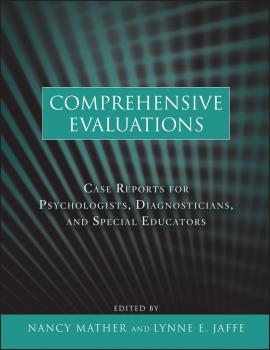Mather Nancy
Список книг автора Mather NancyEssentials of Dyslexia Assessment and Intervention
Quickly acquire the knowledge and skills you need to effectively understand, assess, and treat individuals struggling with dyslexia Essentials of Dyslexia Assessment and Intervention provides practical, step-by-step information on accurately identifying, assessing, and using evidence-based interventions with individuals with dyslexia. Addressing the components that need to be considered in the assessment of dyslexia—both cognitive and academic—this book includes descriptions of the various tests used in a comprehensive dyslexia assessment along with detailed, evidence-based interventions that professionals and parents can use to help individuals struggling with dyslexia. Like all the volumes in the Essentials of Psychological Assessment series, each concise chapter features numerous callout boxes highlighting key concepts, bulleted points, and extensive illustrative material, as well as test questions that help you gauge and reinforce your grasp of the information covered. Providing an in-depth look at dyslexia, this straightforward book presents information that will prepare school psychologists, neuropsychologists, educational diagnosticians, special education teachers, as well as general education teachers, to recognize, assess, and provide effective treatment programs for dyslexia. The book is also a good resource for parents who are helping a child with dyslexia. A practical guide to understanding, assessing, and helping individuals who have dyslexia Expert advice and tips throughout Conveniently formatted for rapid reference Other titles in the Essentials of Psychological Assessment series: Essentials of Assessment Report Writing Essentials of School Neuropsychological Assessment Essentials of Evidence-Based Academic Interventions Essentials of Response to Intervention Essentials of Processing Assessment Essentials of Conners Behavior Assessments Essentials of Cross-Battery Assessment, Second Edition Essentials of WISC-IV Assessment, Second Edition
Comprehensive Evaluations. Case Reports for Psychologists, Diagnosticians, and Special Educators
An invaluable collection of sample case reports from experts in child and adolescent assessment With contributions from authorities in the fields of psychology and special education-including Dawn Flanagan, Elaine Fletcher-Janzen, Randy Kamphaus, Nadeen Kaufman, George McCloskey, Jack Naglieri, Cecil Reynolds, and Gale Roid—Comprehensive Evaluations provides over fifty sample case reports to help you draft carefully planned, goal-directed, and comprehensive evaluations that clearly explain the reasons for a student's school-related difficulties, from preschool to postsecondary level. A wellspring of information for educational professionals, Comprehensive Evaluations provides models for writing diagnostic reports to accompany the tests most frequently administered in the evaluation of children, adolescents, and adults, including the BASC-2, KABC-II, WAIS-IV, WISC-IV, and WJ III. The reports reflect various disciplines within psychology and education, different theoretical perspectives and paradigms, and span a broad spectrum of disabilities. The diagnostic reports found within Comprehensive Evaluations will help: Expand your familiarity with widely used test instruments Enhance your understanding of the interpretation of test scores Improve your ability to tailor written reports to the purposes of the evaluation Translate assessment results into meaningful treatment recommendations Recognize the differences in what evaluators from various school districts, agencies, and private practices consider to be a comprehensive evaluation Appreciate how your theoretical perspective and choice of tests can influence diagnostic conclusions Determine a report writing style that meets your needs Comprehensive Evaluations deftly illustrates how thorough assessments help empirically pinpoint the reasons a student is struggling in school, which then allows an evaluator to select the most appropriate accommodations and interventions to help the student succeed.

